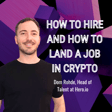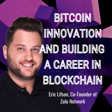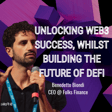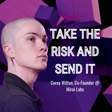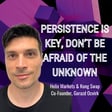Become a Creator today!Start creating today - Share your story with the world!
Start for free
00:00:00
00:00:01

Thrive Protocol’s Mission, Matt Carano’s Journey, and How to Break Into Crypto
Jack speaks with Matt Carano, Head of Ecosystem at Thrive Protocol, in this Behind The Blockchain podcast episode.
From his early days as a Bitcoin enthusiast in 2013 to navigating the wild highs and lows of the crypto space, Matt shares his journey, insider tips for breaking into Web3, and the secrets to creating impactful content that resonates. Discover how Thrive Protocol is fuelling the future of crypto by funding innovative builders and learn why only a handful of projects in the industry are revenue-positive.
This Episode is packed with actionable advice on building a career, avoiding scams, choosing the right ecosystem, and is a must-listen for anyone eager to join the crypto and blockchain industry.
Transcript
Introduction to Matt Carano and Crypto Journey
00:00:01
Speaker
Matt, welcome to the show. How you? I'm great. Thanks, Jack. Happy to be here. 8 a.m. m my time. I think it's not your time. So we're at opposite at and opposite ends of the spectrum. But um I've had my, or I'm drinking my coffee and I'm ready to go.
00:00:15
Speaker
Nice. Yeah. Quarter past eight in evening here for me. So yeah, exactly opposite. And I'm not drinking a coffee at this time of night, but's um but, but no, thank you for for joining me.
00:00:27
Speaker
Matt, for people who don't know who you are, could you give us a bit of an introduction, please? Yeah, my name is ah Matt Carano. I'm head of content at Thrive Protocol. um I've been with Thrive almost a year. It's been, it's crazy how fast it goes. Everything goes fast in crypto, um but sometimes it feels super long and sometimes it goes super fast, but whatever, it's almost been a year.
00:00:48
Speaker
I've been in crypto a long time. i first fell in love with Bitcoin and in 2013, where a friend of mine showed it to me. I was like, man, you got to take a look at this and didn't quite get it right off hand. But as soon as I did and understood kind of the implications of it completely like changed the trajectory of my life. And for the last, i don't know, decade plus, I've mostly been working in crypto in various roles. but typically on the on the marketing side of things so um yeah that's uh that's a little bit about me that's cool 2013 pretty much an og at this point yeah i don't like to brag it's not like i put it in twitter bio but but yeah i've been i've been i've been around a long time and seen a lot of stuff um i know you and i were chatting uh you know before this like last week sometime and
00:01:35
Speaker
i've seen everything like i i tell people i've no one's been more rugged in crypto than i have like as part of my by the group or the project that i was working on and in in 2017 we were part of that we were we got hit by the parody multi-sig wallet hack you know stole most of our our our eth killed our runway um just seeing everything seeing the the good the bad and the ugly but um But it's super inspiring.
00:02:00
Speaker
It's one of the most inspiring spaces to be in. You can find some the most inspiring people to really trying to change the world for the better. So um you take it all and yeah happy to happy to be a part of it.
00:02:13
Speaker
Yeah, you're right. Well, I've got ton questions and we can dive into yeah the good, the bad and the yeah ugly of it a little bit later on.
Career Progression: Musician to Crypto
00:02:21
Speaker
Could you talk us through your career journey so far?
00:02:26
Speaker
Yeah, I mean, so I'm a musician by trade. I went to to music school, um play a lot of instruments and write and record and release. So I've always been kind of on the content side of things, although I didn't really know that as a job ah early on. So i have ah I have an education degree, actually. but I didn't want to teach in a public school.
00:02:45
Speaker
It's some I a student taught in a public school. It's not it's not an amazing place to be. ah So um whatever, long hours, low pay, yeah all the administrative stuff. and And it seems to have even gotten worse since since I was since I was in school.
00:03:02
Speaker
so many years ago. but But anyway, I eventually found myself um really enthused with a a project. So my the first project that i that I started working on in in crypto was for a a Bitcoin ATM company called Lamassu.
00:03:18
Speaker
and The reason why I started working for them is they were scaling up super quickly. it was two brothers. um They were living in New Hampshire, which is where I'm from. So we met, we were friends and like, dude, we got so many, or Bitcoin was starting to take off.
00:03:30
Speaker
um It was that March to ah to a thousand, I think was the, first that first, kind of the first big move in crypto where were like, oh man, this might actually, this might take on a little bit.
00:03:41
Speaker
But so they were scaling up and they, they added me on and I'm just, you know, I'm, I'm kind of a generalist where I can do a number of things kind of okay. And so I, I was more on the operation side, but I did some marketing, some sales, whatever. um But yeah,
00:03:56
Speaker
But it wasn't until I started working for a... I was working on ah a project called Swarm City, which is one of the earliest ICOs. This was in 2016 or so, late 2016. I was super enthusiastic about the project. um it it was um It was really geared towards... There was this whole... like anti-Uber movement across the United States at that time. And so it was a lot of rideshare drivers who were looking for Web3 alternatives.
00:04:27
Speaker
and And Swarm City was trying to solve that problem, basically a decentralized marketplace um where two parties could connect, governed by a smart contract. there was um There was an escrow element to it, reputation element, whatever. it was Uber without Uber. but But I realized that if you could solve that issue or Uber, you can solve it for any type of marketplace, whether it's a retail marketplace or peer-to-peer or whatever.
00:04:50
Speaker
And so I was like, I kind of instantly understood the scope of this project and the founders were all Belgian. And so English was a second language and I'm a decent enough writer. So I just started getting involved and was like, hey, listen, let me edit your announcements and and et cetera. And started just doing more and more content around around it. And they brought me on kind of full time. so I was early enough where i I don't consider myself a founder of that project, but I was definitely on like the founding team um through the Parity Multisitial Wallet Hack.
Roles at Gitcoin and Thrive: A Web3 Generalist
00:05:22
Speaker
But it was that time too, I was like, ah because um I like to do my own um ah music and other type of content, that I just learned some skills like video skills, et cetera. And so I just became...
00:05:33
Speaker
better at making content in general and that kind of followed me through through the rest of my roles so i worked at gitcoin um when gitcoin did the token and dow launch i did all the content uh for that which is crazy crazy times i think that was 2020 or 2021 and then i was with another crypto og company a little bit later on called status um i was uh their head copy but basically all the content that everything is copies sorry all the content kind of went through me and then for ah and and And now for for Thrive, had a content. Now, again, it's a startup and all you know a lot of these Web3 companies are all startups. So youre kind you kind of, it's if you're a jack of all trades, if you can like, you know, get in there and do different stuff, sales stuff, talk on podcasts, do content.
00:06:19
Speaker
advocate in you know in different arenas, you you may be in front of boards or you may be with builders or you may be on Twitter or whatever. But if you're if you have kind of a more general skill set, you can kind of find your way. And so even though I'm head of content thrive, I tend to do a bunch of different stuff.
00:06:35
Speaker
But Yeah, that's that's the career journey. um i just You just learn skills as you need to apply them and use them and then hopefully you become more valuable over time. And and yeah, that's it.
00:06:48
Speaker
That's me. That sounds cool. Sounds cool. um Were there any particular challenges that have really surprised you throughout your journey so far? And that's quite a vague question because there's probably quite a few, but they' are there any that really spring to mind?
00:07:02
Speaker
Yeah, I mean, so ah the the challenge for me, and I might be unique to that. oh Well, I'm sure there's a ton of people in Web3 that are like this, but it might be, it still might be like an a narrower challenge, is I have a hard time working for any org that I'm not physically, like or philosophically, not physically, philosophically aligned with.
00:07:21
Speaker
Like, that's really hard for me. It's hard for me to just take a paycheck. um And you can make a lot of money if you just pay take a paycheck or if you just do sort of short-term thinking in Web3. There's a lot of money there. So I think I've left, think the challenge for me is I've left a lot of money on the table.
00:07:38
Speaker
um But really, there's just this switch in me that if i don't if I'm like not bought in, I just can't ah just can't do it. So that's a super challenge. um But I also hope it's a good thing. like Anybody who's coming into Web3 right now, like i would just I hope that they find an ecosystem or community that they really buy into, that they really believe in.
00:07:57
Speaker
um It's a lot more fulfilling if you do it, even if it means some money is left on the table. um But that that's been the biggest one. and And I think it's more, it was easier it was easier early on to that to that to have that not matter because Bitcoin was number one and Bitcoin still in my mind, like ah I love Bitcoin.
00:08:16
Speaker
There's some challenges with Bitcoin, but I still love it. So working at Lamasue was not a, that was easy. Like that wasn't a philosophical move whatsoever. But now because there's so many different projects and blockchain, tens of thousands, millions of, projects I don't even know.
00:08:31
Speaker
So many projects. It's hard to even know where to start. Like if you were, if I were just jumping into that, it's kind of like dating. Like I, I married before the, before the whole, like, ah you know, swipe right stuff. So I just missed that, that whole thing. But like, if I, God forbid, i'd never want that to happen.
00:08:49
Speaker
Of course, my wife's amazing. um But if I were ever like a bachelor again, I would i would not, this would be a completely, know I sound like an old guy, I'm an old guy. i was That would be so foreign. But same thing, if I were like looking for jobs in Web3 right now, would be that would be the challenge for me.
00:09:04
Speaker
It's like, what ecosystems do I target? Like, I don't wanna just pay take a check. So that would be that would be the the hard thing. um And I think it gets sort of increasingly harder as there's more blockchains and more projects. But um anyway, that was my, I think that was my, that would be the ah challenge for me.
00:09:20
Speaker
Makes sense. This might be quite a challenging question. If you were going a start now and you were trying to even choose an ecosystem, where would you even go to to do that.
00:09:33
Speaker
So if someone's listening and thinking, where do I start? They like the idea of of web three. I do I guess the place to start is make sure you really are passionate about technology. You are passionate, interested in in crypto blockchain, uh, decentralization. Like if you're interested in the ethos of the space, great. If you're not, it's probably quite a difficult industry to break into.
00:09:54
Speaker
But say if you tick that box and and that sounds great, where do you go to even find ecosystems?
Choosing the Right Web3 Ecosystem
00:10:01
Speaker
Yeah, that's a great question because, um, like, first of all, yeah I think your suggestion that you have to really know that you're passionate about is is a really good one.
00:10:09
Speaker
Um, cause I'm, I like interview people. Um, I just interviewed someone last week and and every time I do, I ask them what brought you to web three. And like what I'm looking for is I'm passionate about the technology because I think it will, um it's like the best coordination tool on the planet and it will be amazing for the human race if if if if crypto is mass adopted.
00:10:35
Speaker
Like we'll have a better, we'll have a fair, um you know, a a like just a better world. So that that's the things that i'm looking at. But i'm I'm actually shocked when people actually answer me, like I'm in for the money. And it's like, okay, but that's fine. Like do that. But then it is going to be hard because lot, cause projects are really, they tend to be very community minded.
00:10:58
Speaker
It's like, you know, it's, it's part of how a, a, I mean, you just think about the incentives of of what Web3 is, it's like the token and smart contracts align incentives between traditionally adversarial parties, right? It's the the the user, the the team that's creating the thing, and like the investor. and but But we're all aligned with this token now. So it just kind of lends itself to being um more of a like a like community becomes super important.
00:11:25
Speaker
And so, yeah, so you have to find, so make sure you're passionate, but then you have to find, you have to know like what moves you about it and then find, right, the appropriate um the appropriate community for that. I think it's hard. I think it's like...
00:11:41
Speaker
But you can make it easy like it easier. If you're like, oh, well, I love the idea of DeFi and banking the unbanked and like all that stuff. Well, then that kind of narrows it down. Or if you're like, I love i want i love this idea. that For me, the the one that that super moves me and we have not solved this problem yet is the is the problem that Swarm City was trying to solve, which is decentralized marketplaces. like I want decentralized marketplaces.
00:12:03
Speaker
And then I want crypto states. and like That's the order of things. Well, first, it's it's privacy, which will lead us to being able to have, um, have decentralized marketplaces and, you know, not have them shut down.
00:12:15
Speaker
And then eventually crypto states, um, that's what I want. So if, but if it's marketplaces, like find that, or if it's, um, Oh, if it's, uh, if it's social, um, then, you know, like farcaster and that type of stuff, there's ah tons of apps that are working in that ecosystem. It's like kind of define the thing that, that, that you love about it and, and let that, that guide you.
00:12:37
Speaker
Um, Yeah, but but it is hard because there's so many projects. Also, like you know determine what blockchain may be. Are you a Ethereum person? Are you Solana person? Are you Bitcoin person? there's There's actually some great projects building around Bitcoin right now. um I can't tell you what which one it is, but there's one that's partnering with um with with ah with Thrive that we're going to announce here pretty soon.
00:12:59
Speaker
um I wish I could give you the alpha, but I just can't. But it's awesome. like I love it. It's an ecosystem building with Bitcoin, like bringing Web3 to Bitcoin. It's so awesome. um It's like, finally, this is you know this is happening on on Bitcoin.
00:13:11
Speaker
If you love Bitcoin, then there's an ecosystem there for you too. So yeah, I don't know. It's it's it is a hard. it's it's hard But start with your passions, figure out the chain, figure out the the the vertical that that super moves you, and then target ecosystems from there.
AI Tools in Web3 Research
00:13:28
Speaker
Yeah, nice. Good advice. i think really working out the types of problems that you want to solve, I think is super key. Yeah. Not just from a chain perspective, but also from, as you said, like what the, what are the the issues that i really want to solve? Is it tokenization? Is it decentralized marketplaces? Is it defy? Is it actually just really want to build ah the info that keeps the space running? Like what is it and what the challenges that that you want to solve?
00:13:56
Speaker
I think a lot of the time you might even have to try and learn about a lot of stuff to really understand how these things work before you might understand what problems you really want to solve.
00:14:07
Speaker
So maybe the place to start is try and give yourself the best like self-education possible and understand. I'll try it. You don't have to understand everything on like a super deep technical level, but just high level.
00:14:18
Speaker
What does everything do? How does it work? What impact is it going to have? um And then I think you can really start to work out where do I want to be? Yeah, that's right. And you know the amazing thing about this time is now we have AI, which can really help us research this stuff. you know um i mean, but even before AI, but like YouTube was a great place. It's like, oh, I'm interested in this problem in Web3 or in crypto or whatever. mean, you just search that out and you can find tutorials about it.
00:14:46
Speaker
Oh, I want to be a dev. Well, there there's so many tracks that if if you're a tech, if you're like a tech forward type of person, you love you're a developer, There's so many um educational tracks now.
00:15:00
Speaker
ah There's Speedrun ETH. Even if you just go to ethereum.org, there's a bunch of stuff there. All over, um I've seen yeah tons of YouTube channels that educate developers. like There's a lot of information if if you're interested in that. and Then with AI to help you research, you can just put in the criteria and say, I am this type of person.
00:15:18
Speaker
i like these things. This is my philosophical makeup. What are what are some great ecosystems that I should look into? and and uh and ai will help you there yeah like that i hadn't thought of that to be honest like just tell it tell the type person that you are what you like and what you enjoy and then yeah let's suggest some stuff that's a good um yeah that's a good idea i partner with ai like i make ai my friend like it knows my name i get it gives itself a name like we just have nice little conversations i make it my buddy and uh it seems to pretty is that in case they is that in case the ai takes over in the future and you've been nice to it the entire time
00:15:54
Speaker
A little bit of that for sure. But I've found, I mean, I've seen some, there's some some great people like, I don't know if you are if you're familiar familiar with ah Brian Romilly, who's like, ah I follow him on Twitter, but he's like an early AI guy. Like he's been working with AI and trying to teach machines for a long time, super,
00:16:11
Speaker
just a polymath, like a very smart guy. And he showed data that if you're, if you befriend the AI, like if you're nice to the AI and you encourage the AI and you tell the AI, look, this is the perfect type of task for you to do. like If you encourage it, um, or if you give it a backstory, it performs better for you. know So I make it my friend.
00:16:29
Speaker
Interesting. Interesting. I'm going to try that. I'll try that next time. It's funny because I i was using a sorry to tangent, but i was using AI with, um, camera, remember it was someone that I work with. And so they saw how I chat with the AI and they're like, what the are you doing?
00:16:43
Speaker
like Like weird conversational thing. You have a name for it. It was very, it was, it was very funny. I guess ah not everybody does that. I like it though. I'm going to give it a go. I'll let you know if it changes the outcome.
00:16:56
Speaker
Um, um, but could you Could you give us a crash course on how to be a successful marketer, how to be a successful creator of content in Web3
Content Creation in Web3
00:17:11
Speaker
specifically? If someone's starting out and the thinking, that sounds really cool, sounds like something I'd really want to do,
00:17:16
Speaker
um how do you do it? Talk us through it. Yeah, the amazing thing about Web3 is it's like it's any personality type. You can be super earnest.
00:17:28
Speaker
You can be a shit talker. And it all can work depending on depending on the the brand you're working for, depending on who you are as as a person. It's like...
00:17:39
Speaker
You can just, it doesn't, it's not stodgy. It's like Thrive is super earnest, um which is great in my mind. Cause I do like, I do like ah ah the earnest side of, of, of things best.
00:17:52
Speaker
um I mean, I make parody videos and like funny stuff. I like to, I do like to, yeah I do like to, to make funny things, but anyway, I do love that we're earnest because it's kind of what you see is what you get. And it works. um Or or you can you know you can make ridiculous.
00:18:07
Speaker
I make ridiculous parody videos where I'll take popular music. i'll'll I'll rerecord um the audio with you know ah with but different lyrics and just ridiculous. Like you can see my Kaido. We just won the Kaido pre-TGE vote last week. And some of the campaigns around that were just ridiculous. Actually, so ridiculous that my CEO is like, I don't know, Matt. i don't know that we can do But, um well, one, you know, I think everybody has their own unique talents.
00:18:39
Speaker
So one is you have to lean into that. Like I love doing podcasts like this one, doing spaces, being live. i've just had a lot of reps on air. So I really like doing that. And I feel like um it's a good use of my time because I can, if I'm in the right place, I can talk to a lot of builders, which is who we're trying to attract and thrive.
00:18:56
Speaker
I love doing that. That's a skill set. I like to evangelize that I have. so So that part of it is like, that's my niche. so i So I go that route. Or I like making ridiculous, funny videos. So you know that that's my route. So you have to really know what your skill set is and what you love to do.
00:19:11
Speaker
That's the first thing. And then um it's a lot of data. And this is a lot of people in crypto don't like to think of it in this way, but it is. um We can test and see what works, see what doesn't work in many different ways, whether it's ads campaigns, you do any sort of, if you did Twitter ads or or or Google ads or whatever, or or any sort of outreach, you can test all that. Email outreach, Telegram outreach, you can test all that.
00:19:39
Speaker
And it's a pain because you're if you don't like um if you don't like looking at spreads, start to like spreadsheets because they they they become a part of your life.
00:19:50
Speaker
But it's the only real way to know if you're growing well. Like it's so easy in Web3 to pay a bunch of KOLs to get their followers to to follow you, but they're all they're not good. Like they're all bots or they're all they're all like very, very low quality accounts.
00:20:06
Speaker
Not low quality people, but low quality accounts. um It doesn't work. I'm gonna tangent again. there's a There is a Web3KOL firm that I'm familiar with that they were bragging you bragging about how much impact they had to the token.
00:20:23
Speaker
And if they so they sent a graph about it, like how much the token went up whenever they sicked their KOLs on on the world. And it did, but then what it do right after that? Tanked. and then if you And then if you watched it over, then they did these three campaigns and each campaign had a lesser high and a lesser high. So the whole graph was a down to the right. And you're like, you're bragging about that?
00:20:46
Speaker
That's crazy. um The KOL stuff is, um it's just not like, it's really, it's um it's hard to find like real real hype that way. and So being authentic and looking at a bunch of numbers to see what resonates with your community is the way to go. So I guess to round it out, it's know what you love to do, what your strengths are, and then get very comfortable in in testing because it's the only way to to know whether you're resonating with your audience. You also have to be very clear about who your audience it is. It's Thrive. It's builders.
00:21:20
Speaker
We fund builders. That's it. Top ecosystems give us money, and we have to go out and find great projects to fund who will deploy and scale in their ecosystems. It's great job because we get to give people money all day.
00:21:31
Speaker
That's amazing. But you have to know who you're talking to. um You have to figure out where the builders are. And for us, we have to figure out where the builders are and deliver the deliver the message. So you have to know who your audience is, where they are, and and and create the content or create the message specifically for them where they where they live and and then test.
00:21:51
Speaker
um I like that. Great advice. Thanks for talking us through it. You're welcome. Sorry. I'm long winded around it. There's just so much. no it's good. more more detail, the better. i'm absolutely okay with, with detail. It's all good. Um, you mentioned there around, some question marks on Wells.
00:22:09
Speaker
I think they played obviously a big part in the industry over the last 10 years. um Do you think the KOL, we'll call it the KOL craze, I guess, do you think that will start to come to an end at some point over the next couple of years if they're not not necessarily working as well as they could?
00:22:28
Speaker
Yeah. So I think that there are great advocates who have a big, um, who've built ah a great audience, like a real great audience.
Challenges in Crypto Marketing
00:22:37
Speaker
Uh, and if they're passionate about your project can be extremely helpful if they're on your side. I think there is real, its just like anything there's like, there's a certain percentage that's real and great and amazing.
00:22:50
Speaker
We've done great work, uh, who have a lot of credibility. just Just like anything else. And then there are the same thing on on the project side in Web3. There's some great projects out there. There's also some crappy projects.
00:23:02
Speaker
But I think what we're like what's what I've really been awakened to is is a few things in crypto. One of the shocking things that I realized last my CEO sent me this, um and it was shocked me last weekend, was that there are only 315 revenue-positive projects in all of crypto.
00:23:21
Speaker
That's it. It's all on chain. injured like That's it. That's it. Yeah. So most people rely on tokenization. So they tokenize that gives them ah a treasury, but that doesn't mean that they're revenue revenue positive. A lot of times they're mostly, mostly they're revenue negative. Their treasury is going the other way.
00:23:36
Speaker
So that's it. That is crazy. So that that was that was one of the things that I realized. um so and then And then two, if you just look at the nature of this bull market and what's happened, you've had all these tokens launched, a lot of meme coins.
00:23:48
Speaker
And I have no problem with meme coins. Like there's some legit um great opportunities there. uh every set like i'm i'm i'm positive just like in music there's something great in every single style of music and you know i even country there's there's some great music country same thing with with the verticals in crypto there's plenty of great projects in every single vertical but um a ton of launched and tanked and and ah and so i wonder I wonder like how much retail there really is.
00:24:20
Speaker
um And I also wonder if if people are just real... like i think this cycle, people are just awakened to the fact that it's only that a lot of projects that launch... There are a good amount of projects that launch that aren't actually creating impact or value.
00:24:37
Speaker
And if that happens, the token's going to just... be crushed It's just going to tank. And so, um and I think the KOL, like, ah I don't want to, I'm not blaming all of them. As I said, there's good, there's great KOLs too, but a lot of them have just swarmed retail into a hype cycle.
00:24:58
Speaker
they got crushed and they're just there and they're not being replenished. like the those ah Those folks aren't coming back in. i really think we're at this crux point in crypto where if we want to attract, by retail, just mean the consumer, the the user, people who are are using the these amazing apps and this amazing technology,
00:25:16
Speaker
If we want to attract them, we have to have real real value there, um which means, which is part of Thrive's mission is we are looking for impactful builders to fund. that's That's the criteria. We're not going to give funding to um projects that that don't create impact.
00:25:32
Speaker
And so ah because... We think that crypto won't grow. ah it's it's not going to It's not going to grow if we do the same things over and over, where tons of funding going to very short-term thinking, to projects that don't create value, that just tank.
00:25:47
Speaker
And yeah, KOLs have have really fed into that because... It makes sense. it's It's just they pump the token, they make they make some money and and that's fine.
00:25:58
Speaker
um But i think it's I think that's drying up. I don't think people, i don't think their consumer is coming back in. They're too wary ah at this point and and it's just not as effective anymore.
00:26:10
Speaker
That's what think. Fair enough. That makes sense. think it's tricky as well, isn't it? Especially when you've got... ah big exchanges who asked for, right, you need to have a minimum of this many followers on Twitter, for example, for us to even consider listing you on on the exchange. I think somewhere, um,
00:26:30
Speaker
I think somewhere I was reading there, some of the exchanges asked for like 300k followers and like this kind of stuff on Twitter and things. You can see why projects would turn to to KOLs and KOL agencies when they would say, we can guarantee you X number of followers. They don't necessarily care if they're and like legit accounts, as you said, like a lot of them might be bots and this kind of stuff. But if they're trying to hit that criteria and it's going to make or break the project, if they can get listed on these exchanges, well,
00:26:57
Speaker
So what you do, you kind of, your hands are tied at that point, you have to do it, right? There's no other, i mean you can't I mean, organically you probably can get to that point eventually, but it's not gonna be as quick as if you get tons of KOLs on board and you're thinking, right, we have to launch because we're in the middle of a bull market and we need to launch now because otherwise we'll miss it and then we've got to wait two years.
00:27:17
Speaker
um You can see why. Absolutely. And I think exchanges going to have to change because if they're going to, if market makers are there, if, uh, you know, supporting a token or exchanges are going to support a token and those are the requirements, um, instead of, is this an impactful project?
00:27:38
Speaker
They're going to learn because the token's going to tank. I would imagine they would, maybe that's next cycle learning for exchanges. I don't know. But yeah, I agree. it's it's um It is visual. It's it's a it's ah yeah it's a visual thing where for them where you do have to hit these um these metrics that don't really show show value. like It's really hard.
00:28:00
Speaker
and and ah Most of the top projects that you know of have done that. Like if you look at their engagement, they might be hundreds of the thousands of account or a million account. I mean, they did it um probably through They probably have a lot of bots and and spam followers. you can You can see in the engagement.
00:28:17
Speaker
that, oh, no, this looks like engagement. you've been If you're around or long, you kind of know what what engagement should look like at different tiers. Like, what does the 10,000 follower tier look like in terms of engagement? What's 100,000 look like, a million?
00:28:30
Speaker
And you just kind of eyeball test. but and But most of them did it or or do it, and I totally understand i understand why. but um But it's not real, and and that's what crypto needs to change. It's like impactful and real.
00:28:44
Speaker
That's what needs to what needs to be about. Yeah, fair enough. So um I think a lot of people would look at your role as being pretty cool. I can imagine it's pretty fun.
00:28:56
Speaker
Head of content at a bunch of different projects ah now.
Daily Life as Head of Content at Thrive
00:29:00
Speaker
Obviously at the moment you're ah you're at Thrive. and And I think a lot of people would look at that and think, you know what, I'd love to be in that position.
00:29:06
Speaker
That sounds great. you talk us through a day in the life? Like what do you actually do as a head of content at Thrive? Like what do you deliver on a daily basis? Like what is it that you you do?
00:29:18
Speaker
I know the ah short answer is it varies probably, but can you just give us a snapshot? Yeah, as i I talked about before, I'm kind of a generalist, so I'm i'm in the middle of a lot of things ah right now. But from ah from the content side, we've got this really great campaign that we're running right now. um I mentioned that that ah that that Thrive partners with the top ecosystems like like Polygon and Arbitrum Apecoin and Hedera and Zion and a bunch.
00:29:45
Speaker
and And they allocate part of their treasury to us. um And then we in turn go find and fund impactful builders to go and and deploy in their ecosystem. So we... um I'll just give you a little bit of the backstory. Like in general, we were very good in the past about marketing our our initiatives with our partners, with like Polygon whatever, and not so good about marketing Thrive as its own brand. We were just not good at that.
00:30:11
Speaker
um And so we changed because right now, ah you and i were talking about this before the podcast, but like we have so much funding committed to us right now that it yeah that we have to change our approach in how we go and attract the builders. It used to be that we would launch a campaign like Thrive. It's like Thrive Polygon. We're launching Thrive Polygon.
00:30:35
Speaker
Here's the funding. Here are the verticals that we're funding. We would do a launch space. We would do a ah call for um ah call for applicants. We'd do that over a two-week span. We'd get in a bunch of applications. We'd sort through it.
00:30:48
Speaker
Over the course of the next week or so, we'd figure out which projects we were going to fund, and then they would hit milestones, and we would go. um We can't do that anymore because of the amount of funding we have to deploy that we have to always be attracting builders always. So our postures change. So anyway, ah we came up with this really cool kind um campaign because we we want to be known as the, as we are like, we're the largest builder funding protocol in all of crypto. Like we want to be known as that. And I don't know that the zeitgeist really knows that. So we came up with this campaign called build real and where we showcase um some of the impactful projects if that have come through Thrive or that are still still being funded through Thrive initiatives.
00:31:28
Speaker
And we do um and so we'll we'll we'll pick four or five of them every week. um And we'll write an article about them. We'll make some great like impact ah Twitter designs. And you can check at Thrive Protocol on Twitter. You can kind of see all the the whole Build Real campaign.
00:31:45
Speaker
um Zach, who's a a writer at thrive phenomenal writer at Thrive, write a wrote a manifesto. It's it's currently currently pinned to our ah profile on Thrive. It'll pump you up if you read it. um And then we do a live demo show, demo competition show for them.
00:32:01
Speaker
um We just did it yesterday, morning, Thursday, as we're speaking, where all all the projects get together in this live stream and they demo their product in this and in this competition against each other. And whoever wins, wins 50,000 Thrive Points.
00:32:13
Speaker
um It's just kind of a fun, you know, live type of thing. And then from that, and so people watch it live and then there's a vote. There's a, like there's a vote during it on who wins. It's just this this fun little initiative.
00:32:25
Speaker
And then after that, we, we cut out the, the demos and and post those on socials as well. So it's this whole like campaign where we're featuring, um the like the the the ah to the audience, like the the amazing ah to our prospective audience, the audience that we want to attract these builders with successful builders in our ecosystem and they're in kind of a fun way. So um so I'll help ah shepherd that um through it's a weekly thing so every week we need to get interviews so that we can write the articles and then prep for the show and like all this i produce i'll produce that show um i don't host that show up but i produce it so that's like a whole process that that i work on on on a day-to-day basis um i also talk on spaces like i'll space hop a bit usually for a while for like january february i think i was doing i did probably like 40 spaces and in that span of time but
00:33:19
Speaker
It's less now, but I'll go out and evangelize for Thrive either on a great podcast like yours or on on spaces or live streams or or whatever. um Just trying to get in front of different different groups to let people know that Thrive is a place for builders. We need builders come to Thrive. um i will Sometimes I'll write.
00:33:36
Speaker
Sometimes I'll do website copy because every single one of our deployments, our our partnerships, our initiatives have its own website. And and so like I'll work on that. It's just, um ah yeah, i ah if you are someone like me and you can write a little bit and you can do a little video work and you can talk a little bit, whatever, then and um then you could do any of those things sort of on on a daily basis. but Or I'll make a ridiculous video.
00:34:03
Speaker
um I do like you know voiceover work to these ridiculous videos. or It's tough to describe them without someone seeing them, but you can find them on our Twitter account. but all of that um i'll work on and then just if there's any sort of bigger projects i'm on the leadership team so if there's another like big kind of rock that we're trying to push forward i'll i'll work on those but it it varies it it really does um you just um the what you have to sort of ground yourself in what what are the big rocks that we're trying to move What are the overall campaigns that we're trying to move forward?
00:34:35
Speaker
um And yeah, and and and then try to be the most impactful you can be pushing those forward. Nice. And this might be quite a hard question.
00:34:48
Speaker
Where do you go to learn all of those things? Is it just skills you've picked up throughout your career and they've just... just happens to be the perfect mix of of skills and experience that means that you can do really well in this role or have you consciously gone, right? So I need to learn, i need to learn video editing, i need to learn writing, I need to learn how to speak, I need to learn all these different things.
00:35:12
Speaker
Was it just a happy accident that it just all came together? Yeah, I mean, for me, what is it? Is it necessity is the mother of all invention? Is that the is that the phrase? that Yeah, I think that's the saying. yeah Yet that's how it was for me. It's I needed to do a thing.
00:35:30
Speaker
I didn't know it. like I couldn't didn't want to couldn't pay anybody to do it or um couldn't partner with anybody to do it. So then i learned it. like And it's I am... I'm kind of the worst at this too, because I didn't learn audio recording and production until quite later on. Like I should have started doing that right as I was writing, starting and writing to and then performing when I was in my, my early Well, I've been playing music since I was a young child, but when I sort of recognized, Oh, I love writing songs and, and, and, and performing them, I should have learned audio production like right then. And I didn't, I progressed at probably a decade. I progressed. And no,
00:36:05
Speaker
I don't want to be on that side of the... I just i was obstinate about it until I was like, oh, fine. um And then I learned to do it. Same thing with video production. like, I don't really want to do this the video work. But then, you know, it's like, okay, but should I pay someone for it or ah whatever? So then you just kind of learn it. I think actually folks who are younger and and getting into the job force right now have it just are just more innately like...
00:36:31
Speaker
attracted to doing that type of stuff if they're at all um um interested in in making content because if you see like the successful content folks right now they're making videos they're talking on podcasts they're they're they're just they're doing kind of all that stuff maybe not i like to think that i do uh that i audio production very well like i'm very skilled at that so maybe Maybe not at the level that I think I'm at there, but still at a level enough where it it works. So a little bit of audio production, a little bit of video production. And then i and then just what happens, I think, is is it opens doors and you just decide what door you want to walk through.
00:37:09
Speaker
um So i like I'm someone who likes to keep like the options there. And so then if I needed to focus on... If I needed to focus on doing a lot more video work right now, I could. And I would spin up. Like, I learned how to animate and all sorts of ridiculous things.
00:37:25
Speaker
um If I need to push on that based on the type of campaign that's going out, or what then I would focus on that and and get a little bit better as as I went. But I do think that people now are just more inclined to being able to do that type of work. Plus with AI, now all the tools are a lot crazier.
00:37:44
Speaker
um I use AI-infused video production like Descript does things that and would take forever. It can cut out my background. if i do a So I'll sit right here sometimes and I'll and i'll do ah ah kind of a first-person video announcing something.
00:38:00
Speaker
And um with one click of the button, Descript will remove my background. And then I just have a black background behind me. And it's like, that would have taken me, seven years ago, would have taken me forever to cut myself out of that thing.
00:38:11
Speaker
But now it's just a click of the button. Same thing, ah you can get to, um i mean, I'm very picky with audio, but you can get to really pretty decent audio with a click of the button in in some of these tools too so it does make it a lot easier but yeah i would just say it's kind of um i like to keep my paths open and in the options open and then kind of know what my skill sets are what i like to i like to create content so how can i deliver that in different ways and and that just sort of brought me down that path um
00:38:43
Speaker
I do really think people are better suited to it now, though. I really think that if they're content production, they're doing these things already. it was a little I feel like it was harder for me because the tools didn't exist like they do now. But but that's that's what I would do. whatever Whatever necessity comes up, you just lean into it.
00:38:59
Speaker
Fair enough. I think that's good advice.
Thrive's Mission and Funding Criteria
00:39:01
Speaker
um I know you've um you briefly touched on on Thrive. Yeah. Well, you've talked us through quite a bit of of Thrive, I guess. But could you give us a bit more of ah a detailed look into what Thrive is, what you guys do?
00:39:15
Speaker
um Could you just explain it again for people listening? Yeah, of course. um So Thrive is fueling future crypto GDP. ah that That's ultimately what we're all about. And how that works is, I mentioned this before, but large ecosystems partner with us.
00:39:32
Speaker
um And I mentioned some of them before, Polygon, Arbitrum, Hedera, Bizzion, a bunch of them. And they literally allocate part of their treasury to us. here's and And these allocations are millions to tens of millions.
00:39:45
Speaker
And then we take that and then we go and we find great builders. ah We fund them to launch and scale in their ecosystem. And why that's super important for these ecosystems is it's the only way they'll grow, is if we can efficiently allocate their treasury, you know they the lifeblood of their of their ecosystem, we can efficiently allocate that.
00:40:05
Speaker
to um impactful people and projects. That's the only way. Like if they're spending their treasury on things that aren't creating um return on investment, their community will well shrink.
00:40:19
Speaker
um If they can, they they they sent they get to fund ah ROI positive things, their community, their ecosystem will grow. That's that's really the calculus. And why...
00:40:31
Speaker
and why they choose Thrive instead of doing this themselves is because it's super hard to make sure that you're funding impactful things at scale.
00:40:42
Speaker
It really is. And we're talking, like um i mentioned before, we're talking millions of dollars. Like if you were, if you were an ecosystem and you're like, okay, we want to deploy hundred thousand dollars and it's a lot of money, but like a hundred thousand dollars, They could do that.
00:40:53
Speaker
ah One person on the board or a delegate or something could spin up some sort of work stream, could interview 10 projects or something, pick one or two and and do that. But if we're talking about millions of dollars, like in a quarter, that's like impossible to do.
00:41:07
Speaker
how Why we can do it is everything that gets submitted through Thrive. And we'll do community engagement stuff too. Some ecosystems want us to do that. um And I'll tell you like kind of how some folks can compare us to other projects.
00:41:23
Speaker
But whether it's community engagement stuff or it's funding for for projects like grants-style funding, um it doesn't matter. Everything that goes through Thrive gets submitted, has to prove that they've created impact.
00:41:38
Speaker
So if they're a project and they're submitting a milestone, lot of times our milestones are, they're kind of, they follow the same pattern. Like milestone one would be, if it it was through Thrive Polygon, um it would be deploy on Polygon would be your first milestone.
00:41:53
Speaker
They have to prove that they did that they have to submit their milestone it goes to our decentralized reviewer network we call them guardians um And a consensus of them have to say yep, they proved that they did it Here's the on-chain data thumbs up funding gets released if they didn't prove that they did it thumbs down Funding doesn't get released and that's this is true of everything. It's like so we'll do a community engagement stuff had our first season with Hedera was like this where Hedera's got some great apps and And they're like we want more people to use these great apps. Hedera is like, Hedera is such a cool ecosystem. It's very professional.
00:42:24
Speaker
The technology is is like super quick. It's really cool. And there's a lot of great apps there. um So Thrive Hedera season one was like, we want to encourage more people to use these apps because we think if they do, they're going to love it and they'll love Hedera.
00:42:37
Speaker
so we would so through So through Thrive, we would we would reward people for going in, i don't know, minting an NFT or inscribing something to the blockchain or or whatever the the app is.
00:42:50
Speaker
Excuse me, we would we would reward them with HBAR. Even that... They have to submit proof that they did it. Goes to our reviewer network, they look at it, yep, they did what they said they were gonna do, created the impact they said they were going to, funds get released. Nope, funds don't get released. So that way all these ecosystems know any funding they put through Thrive is going to go to something that has created impact, positive ROI.
00:43:13
Speaker
And if it doesn't, it's not we're not gonna spend your treasury funds. That's the innovation with Thrive. No other ecosystem, no other nothing else in crypto does this. And it's so important.
00:43:24
Speaker
Because there are plenty of organizations. So we'll be compared to organizations that do grants. We'll be compared to organizations that do like questing platforms. We can do either of those things. But the main difference is they're all botted, spammed. They can't look and see at scale whether or not the funding that's going through them is actually creating impact.
00:43:45
Speaker
We can't because of our decentralized ah reviewer network. So that that's really the difference in Thrive and why we are saying we're fueling future crypto GDP. Because deal there's a motorcycle going by. But the overall the overall thought is like, if we can make sure that funds, um treasury funds from the ecosystems that we partner with are creating ah ROI, positive ROI for the ecosystems, their ecosystems will grow.
00:44:11
Speaker
And if we can do that over a nott like enough of a span, crypto will grow. And it'll grow the right way, funding impactful projects, not spam, not fraud, not civil attacks. No, impactful projects funding so that we can make crypto grow.
00:44:27
Speaker
So anyway, thats that's a bit about Thrive. we solve um We solve this problem on two ends too. We we solve it for the builders as well. We know how hard it is for impactful projects to get funding in Web3. It's like, we were talking about this before, about how do you know where to start in Web3 if you're trying to onboard, you're trying to have a job in Web3, it's like, okay, what ecosystem do I go to?
00:44:44
Speaker
Builders have the same problem. What ecosystems do I align with? And then what you know how do they do their funding? Is it a work stream? Is it a is a couple delegates? Do I have to do a forum post? Do I have to do a snapshot vote? Do I have to cozy up to somebody? Like, what is the process?
00:45:01
Speaker
Whereas at Thrive, you come to Thrive, come into our ecosystem, and we start sending you funding opportunities based on where you are at, at the life cycle of your project. So you could be a startup, that's okay, as long as you you have to have some things in place. gotta a good team in place, you gotta have a go-to-market plan or a business plan in place.
00:45:17
Speaker
It has to be some things, but you can be a startup. There are ecosystems that want to fund startups, like Metis. and We funded 40-something startups in our last season of Metis. um All the way to you've been you know you're you're you've been launched for a long time, you have a lot of traction. We do funding for projects that have millions in TVL or or hundreds of thousands of transaction volume or a daily active or active users or whatever. so So wherever you are pretty much in the life cycle of your project, probably there is an ecosystem that that wants to fund you. Come to Thrive and we'll show you the opportunities from our partners, so which by the way, keeps getting more and more. Like we were our first year, we had 1 million in funding allocated to us. Second year, 12 million. Third year, 70 million. And it's going up. We expect it'll be hundreds of hundreds of millions.
00:46:05
Speaker
outside shot at a billion maybe this year. It'll be a lot a lot of funding. So lot of opportunities for for builders. Come to thrive so we can get you funded. Sounds amazing. Could you talk us through the ideal but ideal builder or the ideal stage? do you have that or you...
00:46:24
Speaker
You mentioned there that projects need to have some things in place. I guess you mentioned that it could be much larger projects. It could be much smaller ones. I guess the size or stage of project maybe doesn't matter by the sound of it, but just you mentioned there needs to be some things in place.
00:46:36
Speaker
Could you talk us through maybe what those pillars need to be? Yeah, for sure. So the cool thing is like all the ecosystems that we partner with are vastly different. Like ApeCoin is vastly different than Hedera, you know, Polygon's different than Arbitrum. They're all different and they all want different things.
00:46:55
Speaker
Like they're all, they all want different verticals. They all, their communities are, are interested in different things or, or, or maybe um they don't, they don't have a specific vertical. So whenever we partner with an ecosystem, we create a board um like the thrive polygon board, the thrive Adara board, whatever. And you get the the naming convention and um and it's members of, of, of their ecosystem and arc ecosystem. And then we work this out together. It's like, okay, what, who are we trying to to target? Who will,
00:47:25
Speaker
greatly what type of projects will greatly impact your ecosystem? And I mentioned Metis because for Metis, they're like, we want to onboard a bunch of startups that will grow with Metis. And maybe you we'll find some maybe we'll find the next unicorn, we'll find the next killer app.
00:47:41
Speaker
We'll get some great builders on here um doing amazing stuff. Sorry if you hear the lawnmower, but I hear a lawnmower in my background. I don't know if you're catching that. just Not really. Okay, good. It's like super loud. I'm like, what's going on out there?
00:47:53
Speaker
um Usually they mow on Mondays. Okay. So um it's my neighbor. My neighbor does, he's he's awesome. He's the best neighbor ever. And he he does like lawns for the whole neighborhood. It's great. um This is like his retirement job ah to mow. Anyway.
00:48:05
Speaker
ah So, um so yeah, so metta like Metis wanted to fund a bunch of startups and then, but there are other ecosystems who are like, no, we have no RWA. Let's go find RWA.
00:48:16
Speaker
some some of the great projects that have a lot of traction, r roi and just RWA, and just bring them over to our ecosystem. um So, right. So it could be any lifes any any part of the life cycle.
00:48:28
Speaker
I would say though, it has to be a legit project. Like there are projects who who have applied through Thrive that definitely, <unk> they're just like fishing for whatever, but they can show no impact. They don't have a team in place. They've got no website. They've got no business plan or whatever.
00:48:43
Speaker
Our reviewer network, Our guardians, they're going to look at it and they're going to be like, this is not legitimate. And they're going to just pass on it right away before it ever gets um to like the right ecosystem lead from our team who would then um sort of approve it or with the board approve it for funding.
00:49:00
Speaker
They'll just like, no No one will even see it. So if you're going to apply for Thrive, it's got to be a legit project. If you're a startup, absolutely team in place, have a business plan, make your application so easy to read and show like your LinkedIn team on LinkedIn, show their competency. You could show like, oh, this person, we're doing this type of vertical, which means we need this type of expertise.
00:49:24
Speaker
Here's our team member that has this expertise. Make it super easy for our reviewers so they don't have to dig some of them will dig but don't so they don't have to dig and like search um you you want to make it so easy for them to to approve you uh to get you to the next level but yeah legitimately any there are um there's a lot of on-chain projects being requested right now but in the past we have funded media groups we have funded communities like she fives a good example of that she fives onboarding women into crypto um It just sort of depends on the ecosystem, what they what they want to fund. So it could be literally you know any type of project that has to do with crypto, as long as it's legitimate.
00:50:04
Speaker
um It's easier if you do have some traction, if you've deployed and you do have some traction, it's easier to get through. But startup to, you know, later on the lifecycle. It really could be any vertical at all, um which is amazing. and And that's just legitimately what the different ecosystems want. They're kind of all, they're all different places in in their lifecycle too.
00:50:24
Speaker
Yeah, sounds amazing. So they need to have a team in place. ah Do they need to have launched something yet? Or would you fund just on an an idea, for example, an idea in a business plan?
00:50:35
Speaker
We'd want to solve this problem, but we have Nothing, we haven't deployed anything, we haven't written a line of code, we haven't built anything yet. Yeah, so we we grade ah projects that come through Thrive.
00:50:46
Speaker
um We use metals to grade, so bronze, silver, gold, platinum. And it's based on the type of impact that they can show. So impact, ah what we're describing with impact is on chain. um So it's d ah daily active users, it's TVL, it's transaction volume, it's a number of different things. Although we do have an innovation bucket too, which is kind of a catch-all if you're doing something like neat and new. there's plenty I've seen plenty of those. Those are actually the the fun ones to to review.
00:51:13
Speaker
um And so if you are on chain, you've already launched, you would have some sort of metrics associated with your project. Well then most likely you're like silver or above depending on how much. And we tier it, you can see in the application, we sort of tier.
00:51:31
Speaker
Over this would be this level, over this. and And what that does is actually opens the teams up to larger funding amounts. Like you're not going to get as a startup 100,000 in funding. It's not going to happen. you But you could get 25,000.
00:51:44
Speaker
twenty five thousand um So if you if it's a good idea, idea hasn't launched yet, has a business plan, has a team in place, has a good case, you can get funded even if you haven't deployed yet. And usually that first milestone would be deploy on whatever whatever chain, whatever ecosystem the funding is coming from.
00:52:00
Speaker
um So yeah, absolutely. Could be, could absolutely be a startup. um But you should definitely, you should have some things in place. Like you should, you should, you gotta be real or, or you'll, you'll just never get through. You have to be, have to be legit.
00:52:13
Speaker
That's cool. Sounds like you guys are solving, yeah, a lot of problems in in the space. i mean, I know so many founders and builders and funding is a massive issue, right? Like just getting access to funding is is huge. um I mean, most of the space is ran on, as you said, there's only 315, did say? ah Yeah. accept revenue Revenue positives. That means the other I don't know, 20, 30, 40,000, however many projects there are in and in the industry now, that leaves a big proportion that rely on um funding.
00:52:48
Speaker
True. um yeah so Yeah. And we want to get them we want to get them to the place. Like if you're funded through Thrive, what ends up happening is you have milestones that will help you grow and scale. So the first one might be to deploy, but then the second my milestone might be show some movement in whatever direction impact metric that makes sense for your project, whatever that is. But like, let's get to this next place.
00:53:09
Speaker
And then with the next round of funding, okay, let's get to this place. So we are trying to, our whole goal is to create impact for the ecosystems that we partner with. So we are supporting these builders to get to those levels as well. Revenue revenue positive as well.
00:53:23
Speaker
um that's That's the objective. um Yeah. Because it's the only way to grow crypto. Everything else is smoke and mirrors. If we don't actually increase crypto GDP, we're not we're not growing as an ecosystem.
00:53:36
Speaker
um And it'll stagnate. And we want crypto to grow because, I mean, I i don't want to speak for everybody on my team, but my founder for sure. um and And everybody I talk to feels the same way. Like we want a crypto future. And this is the only way.
00:53:52
Speaker
It's building real stuff, um making sure that impactful projects are the ones that are getting funding and not smoke and mirrors. um So, and we are super invested on in in making sure that our builders are successful.
00:54:06
Speaker
that's It's the only way that we're successful. It's the only way that crypto is successful. and It's the way it works. So yeah, if you're a builder in crypto, come to Thrive or message me directly, whatever, come to Thrive and I'll onboard you and we'll onboard you and and get you to like get you the options that that make the most sense for for your project.
00:54:27
Speaker
ah The cool thing is too, once you're in the Thrive ecosystem, we have new partners come on. We have new seasons that start sort of all the time. So if the type of funding that's available today doesn't work for your particular um project, we'll continue to send you funding opportunities as as they come up.
00:54:45
Speaker
And so maybe not today, but maybe like two weeks from now or a month from now, it might be like, oh yeah, that's the one. This is great. um So come to Thrive and and get funded. if you're if If you're an impactful builder, we we want you as part of our community.
00:54:59
Speaker
Amazing. Sounds a great mission.
Entering the Crypto Industry
00:55:03
Speaker
Matt, I think you probably briefly touched on on a few different things over the last 50, 55 minutes or so.
00:55:11
Speaker
um
00:55:13
Speaker
but something you would really want people to know about the industry? You mentioned the growing crypto. I think we need to try and bring more people into the industry, not just builders, but people who are going to work with these builders to help to scale and grow these projects. Right. So is there any so anything you think is really important for people to be aware of before actually joining the industry itself?
00:55:39
Speaker
I mean, it's tough because i I'm a crypto zealot. Like I love k crypto very much, but I'm also, yeah but from this vantage point, I can be very critical of it too.
00:55:50
Speaker
You know, there's a lot of hype but and a lot of things that don't really create much value. Like crypto is a great job at um verifying that something happened, like ah the validity of a transaction. Like we've got consensus mechanisms and we've got a blockchain.
00:56:08
Speaker
So we can see that something happened, that it was true. But we do a very bad job, um until Thrive i would say, about verifying that something actually created value. And so there's so much there's so much that's hype and so much that's not creating long-term value I actually think that that's the majority of crypto right now.
00:56:29
Speaker
It's sad to say, but like if i if i want to be true about it, I would say it's under this. But but imagine if 50% of crypto right now is just hype, is just Wenmoon, is just you know it's just pumping a token only to dump.
00:56:43
Speaker
um it's probably less than and It's probably more than that. small fraction crypto is actually legitimate crypto. you know i would imagine a ah small fraction of cryptos actually like legitimate We talked 315 projects, revenue positive. So what does that tell you? yeah um So, you know, we have to change that paradigm. Like that has to change. We have to stop doing that. Stop funding things that don't create impact or crypto won't grow.
00:57:07
Speaker
It'll just become, um it'll become a ghost town. um So, you know, people coming into crypto, i just, I would just hope that you're in because you're super passionate about changing the world for the better.
00:57:21
Speaker
um And the money's great too and on all that, but like be in it because you want a crypto future and and plug into a community that's actually doing that.
00:57:34
Speaker
um That's actually creating technology. um that is going to move us forward. That's going to help ah human liberty long-term, human prosperity long-term.
00:57:46
Speaker
that's that's what That's what you should have when when you come in. And then just be very careful because ah even the most, the longest, I almost got like... i get I almost get caught.
00:57:59
Speaker
um Don't click on Calendly links from people that you don't know from a Twitter account because they could potentially take over your Twitter account that way. um It's crazy how good the the fraud and the spammers are.
00:58:14
Speaker
you have to be really on guard too. Like I don't do DMs in Discord anymore because people have impersonated our team members, impersonated me, and like I don't, so I just don't do it.
00:58:24
Speaker
Yeah. Just be very careful when you come in. um But also, you know, ah be in crypto because you're an optimist, because you actually think that the trajectory of humanity is is ah is positive and that we're going to have positive outcomes. Know that this is a technology that can lead us there.
00:58:41
Speaker
So, um yeah, I have to be on guard, but like it's also amazing to think about what we can accomplish. Yeah. um Yeah, I don't know. I hope that helps.
00:58:52
Speaker
It feels slightly depressing, but also optimistic at the same time. I don't know, just be real about it. Yeah, I think so. I think it's useful for people to understand that you do have to be on your guard. Because those types of scams, they don't necessarily happen in and Web 2.
00:59:07
Speaker
Not sound the same way. Yeah, it's crazy. Not as much. There are phishing scams. Don't get me wrong, there are phishing scams. People send phishing links and all this kind of stuff. Of course they do. But and in Web 3, they can disguise them very well.
00:59:19
Speaker
And it seems... I feel like everyone, even though everyone is has their maybe online persona or or this kind of thing in crypto, right? Everyone has their Twitter accounts and this kind of thing.
00:59:31
Speaker
A lot of people are fairly anonymous, but at the same time, you can still reach most people. You can either find them on Telegram or Discord um in communities that they're a part of, because communities are all open. You can join each other community you want. You can find who's a member of the group and you can message a bunch of people. And yeah, yeah it's everyone's accessible. Whether or not they want to come back to you or not, it's a different story, but you can engage everyone if you sure try.
00:59:55
Speaker
um I don't know if you do the same thing as me, but I have, um, it's free. I just use the Nord, uh, Nord VPN link checker. Do you use that? No, I don't. I should look into it I have, um, I use a couple other, uh, VPNs, but no, tell tell, tell us about this one.
01:00:11
Speaker
It's just on, uh, it's just Nord, like the security guys, they just have a free link checkers. You can just copy and paste the link into their link checker. will scan it for any malicious activity before you click on it. Um, don't know if it works 100% of the time. So.
01:00:26
Speaker
ah No one sue me ah for saying go and use this if it doesn't work. But um full disclaimer. but um But yeah, I just copy and paste any link from anyone. ah Before I click on it, I just copy and paste it into that pre-link checker and it just says either yes or no. Like this is fine, this is not.
01:00:45
Speaker
um So I use that, which is going to check that out. Yeah, for sure. I wonder if, um yeah, I'll use ProtonVPN. I'll use PIA, like a couple couple of them. I wonder if those have them. But if not, I'll use Nord.
01:01:00
Speaker
Yeah, they should do. look I just use the Nord one because i don't have to pay for it. Well, that's good. It's free. but um All right, cool. That's good advice. And to say if someone goes, ah right, I You what i want to do I know the challenges I want to solve as we spoke about the start of the podcast. um I know the job I want to do. I know the value that I can add.
01:01:23
Speaker
How do i get my first job? What steps if you were to start a job now and at the start of the podcast, you mentioned that you just started to add value. You started writing for projects you start creating content, just started to add value that way. And then you were then kind of incorporated into the project, right?
01:01:44
Speaker
Maybe that is the way that people people do it. I think that's maybe a little bit more difficult now because there are more and more and more people trying to get into the industry, but then there are more and more and more projects to help. So maybe that still still works, but I'd love to understand from you, what steps would you go to?
01:02:01
Speaker
What steps would would you take to get you your job, your next role? Like, what would you do? yeah i think you were just starting out and you don't have a track record, it's it's a lot it's ah it's harder, of course, because you can't point to success um as much. But if you do have any sort of success, you definitely want to make sure that it's um something, if you create impact in another organization or something, even if it's not in crypto, you want to be able to show it.
01:02:26
Speaker
um You want to be able to make it easy for people to show. I will say, so I do recommend find the communities that you're passionate about and start creating value there. um I do think that that's a great way in.
01:02:37
Speaker
Because then you're going to at least be noticed by or interact with a team member there. like We thrive as advocates who go out and help us um help us like promote our projects and help us even promote our our Twitter account.
01:02:53
Speaker
But then also they're out there referring builders to us. So become an advocate in or i don't know ambassador whatever for the ecosystems that you like. And at least you'll be interacting with the team there.
01:03:04
Speaker
And so if you can show value, then you're just one step closer to being able to get a full-time gig there. Um, I also would say like, um, Jack, you're exactly right. There's like a lot more people now.
01:03:17
Speaker
Um, but the caliber is not good. Uh, I can't tell you how many people have reached out to me directly and said, I'm a writer. I'd love to write for thrive. And so I'll send that. I'll, this what I'll tell him.
01:03:29
Speaker
I'll say, send me a piece of writing that blows me away. And then they so what they send me, they take a shot. I answer. Like who answers cold messages? I do. They take a shot. And what they do is they send me the same like very lukewarm blog post about a token or whatever using the same words that everybody else uses. There's no zhuzh to it. There's no move. Nothing about it moves. It's just very generic.
01:03:58
Speaker
And I'm like, you took your shot. You got an answer and you didn't have anything to back it up. So if you have a skillset and you're really good at something, you will absolutely stand out. Absolutely. Another thing too is I interviewed, I've had some of the funniest interviews in web three. It's like not as be professional in your interview. If you ever get an interview, be professional. it doesn't mean you have to put on a suit and tie. I think those days are kind of over in web three.
01:04:22
Speaker
Um, although some people do and they stand out when they do, if they've got a jacket, like it you know and a tie-on like it's it makes you remember um who they are of course so if they're great you're going to remember them um but be professional i had i did an interview with a guy like walk he was walking through the streets of wherever his city was and i couldn't hear a damn thing and like there's noise everywhere i'm like what are we doing like why are like do you want this damn job um ah So I've found that the the caliber is not, your competition, if you're good and competent, not that high.
01:04:57
Speaker
um So stand out, being super competent, being professional, go the extra mile. If you're given a shot, take a great shot, become an advocate. I think those are the ways in, just get noticed and do something great and and you'll find your way. Yeah, i think I think it's still, it's a lot easier to stand out now for sure.
01:05:20
Speaker
I like that. Cool. Taking the interview whilst walking through the streets with traffic around is a fairly, uh, rogue, rogue choice of interview location for me. it's like I can't hear anything you're saying. I ended it early. I was like, listen, just send me a thing and whatever. I ended it early. Cause I'm like, and, and.
01:05:36
Speaker
I mean, I don't try to be that guy. Like I try to be very kind, compassionate, compassionate to people. And I know it's interviews are tough and I try to have empathy, but at the same time, it's like, you're wasting my, like, this is a real job. And like, why are you wasting my time with this journey through wherever you live?
01:05:54
Speaker
That's it, right? Because should I meet the family. i mean, I don't know. Well, that's a chance for someone to make a make impression, right? Like if you've got an interview, you, you have the opportunity to actually interview for so for something.
01:06:06
Speaker
Yeah. Make the most of that opportunity. Do you research, do you preparation, really research into who you're meeting, uh, the company, what they do, what the job entails, um, your goals, your motivations, like even the setup, what you're wearing is, uh,
01:06:23
Speaker
ah Do your headphones work properly? do you have enough enough charge? um All this kind of stuff. ah People just forget, i think. maybe it's the Maybe it's the pressure of interviews or or something like that. Maybe people get nervous and yeah stuff goes out the window and they're just kind of concentrated on one thing, just just overthinking the interview and that kind of stuff. But I think the preparation is is key for me. It makes the interview go way smoother.
01:06:51
Speaker
um Still, if I were to interview, last I was interviewing was about a year ago before Thrive. I, the only, and same thing with being on air. Like I used to be afraid of being on air or speaking in public, but that's a just pretty normal fear is people speaking in public.
01:07:07
Speaker
But I had to do it. And the only way i was I got at least kind of okay at it is because I practiced. I rehearsed. I knew the questions in my head beforehand. I rehearsed my answers. Same thing with an interview.
01:07:18
Speaker
You're exactly right. That's great advice. Know who you're talking to. Because you want to make connection with them. you have to like it it By knowing something about them, you can make connection. That's how you'll stand out. Knowing about the company, what the company does.
01:07:30
Speaker
Um, ah that's another interview question. I always ask, what do you know about thrive? And a lot of times I just don't know anything about it, which is fine. It's not like, it's not a deal breaker, but if you do know it, you're going stand out.
01:07:41
Speaker
And yeah, if you know something about me, you're going to stand out. Um, and, uh, and yeah, rehearse the questions. No, think about like, what are the typical things that people are going to ask you? So that, and, and, and talk, whatever you're in the shower, you're taking a walk, go through the answers in your head so that you're prepared before you ever get there.
01:07:59
Speaker
Absolutely. Preparation is key. I would be crappy in an interview or on air if I didn't prepare for it. It's just the way, the way it goes. So people are na more natural than I am and, and they can crush it off the cuff. But for most of, most of us just prepare that great advice on that, Jack.
01:08:16
Speaker
Yeah, think um I think you tend to find that certain people are very good at interviews, regardless of whatever job they interview for, they'll always make it to the the final stages. I don't know if it's the preparation, the communication style, the way that they're able to, to answer questions.
01:08:32
Speaker
Um, but it's, it's definitely an art to interviewing. And I feel like even if you're good at interviewing, but not that good at the job, you can still make it through the interview just with your communication style. Right.
01:08:44
Speaker
Um, yeah, but, um, yeah. People want to hire who they like to a certain extent. Like that's kind of human nature. So you do have to be, if you're likable, it definitely, i try, as i interview people, I try to guard against that.
01:08:58
Speaker
Like, oh, I like this person, but wait a minute. Like this is a mind game. I also have to hire for the position. um But you gotta like them because it also has to feel like a cultural fit for your organization too. So you you do have you do have to keep that in mind.
01:09:10
Speaker
Do I wanna work with this person? They could be a killer at something. I just interviewed someone recently, killer, absolute, had like great credentials. But I was like, I don't like this person. They bragged a lot about ah about their success. And I was like, this is just kind of a turnoff. It's like, yeah, I know. I read your CV. like Talk to me like you're a human.
Personal Branding and Professional Fit
01:09:31
Speaker
Tell me about you. Um, so, but yeah, who you like you being likable certainly opens the door because ah people are like, we want a good, and especially in web web three.
01:09:42
Speaker
i mean, we're more professional now than, than we were seven or eight years ago, but, uh, it still needs to be a good cultural fit. A little bit more ish, ish, i would say, um, just, just on that around, around, um,
01:10:00
Speaker
uh being likeable and and kind of showing that side to you i actually think if you're looking for a role and if i was looking for a position again um i think personal brand online is key to finding a new role totally i know a lot of people don't like linkedin a lot of people in web3 especially don't like to be on linkedin don't like to use like in uh linkedin sorry but there is At the moment, there is no more powerful tool for showing your job history than LinkedIn. Unfortunately, it just doesn't exist yet. Maybe it will do. And maybe we'll get a decentralized version, fingers crossed because LinkedIn have an absolute monopoly. So us recruiters have no choice really. that's right
01:10:39
Speaker
But yeah, growing a personal brand, you don't have to have tons of, tons of connections, tons of followers, anything like this, but just putting stuff out there, your thoughts, showing people the way that you think and what you think about the industry. like developing opinions on things and posting them ah is super key because as soon as you start applying for these roles if you're reaching out to projects directly you found your problem you really want to get involved in it and then they go over to your pages and then you're not even writing about it or talking about it or are that interested it probably not you're just saying it to get in right so um
01:11:13
Speaker
whether it's Twitter, whether it's LinkedIn, whether it's medium, whether it's YouTube. I know someone who was on the podcast, I think he was on my second or third guest, got a job as a VP of engineering at a very, very large Web3 project because he was posting videos on YouTube, like how-to videos about all sorts of different things. And the founders went, love your content.
01:11:39
Speaker
Do you want to come and run our engineering teams? um that's how powerful it can be not saying that's going to happen all the time but having that personal brand is key to finding a role in web3 i think absolutely and at the very least they're going to look like if i'm interviewing someone i'm going to look and see what's on the twitter account what's on the linkedin of course um it adds legitimacy and there have been red flags like i've i've seen stuff um on twitter where i'm like this is not this wouldn't be a cultural fit here like this doesn't this doesn't make sense. So it it's, yeah, it, it, it, it matters um for sure. But that's a good thing too, because just because it's not a cultural fit for thrive, it might be a cultural fit for, for some other project. So, you know, whoever you are um developing that personal brand, I think is, yeah, that's great advice.
01:12:27
Speaker
um But yeah, we it's, everything's out there now. So we all, we all it's, sometimes sometimes it's a little it's a bit easier now to find things on people as as you all know so um yeah being aware of that sometimes yeah sometimes good sometimes bad sometimes good in that regard right you can't quite can't quite remain as private as maybe you could 10 15 20 years ago um nope but um so if if someone is say they're already here they're working in role and They've been in the industry live for a little while. They've got some experience.
01:13:00
Speaker
How do you set yourself up for success and make sure you're going to have a successful career? Is there a way to make yourself indispensable? Like what what's your but your thoughts on that? My CEO, Daniel Jacobs, who founded Thrive, he says um he says um the most valuable people are those that can automate themselves out of a job.
Specialist vs Generalist Career Paths
01:13:21
Speaker
And I understand it's reasoning ah because if you can figure out a way to do your thing and automate it and make you know make it impactful and and automate it, you're the type of person that can solve any problem. ah and And a lot of times um startups, that's what it requires. Like a most most projects in crypto are, even if they've been around a while are still kind of startups. Like they really are.
01:13:45
Speaker
Again, 315 projects that are revenue positive. So if you're, you know. So most of us are still startups. By the way, Thrive is revenue positive. So and we're not on chain or we would be we would we would we would be on on in that list, which which is great.
01:13:59
Speaker
but um But I like that. I really like that ah that angle from him. It's like if you are somebody who can look at a problem, solve that problem, and put it away so that it's never a problem again, you are absolutely valuable ah for any startup, for any ecosystem.
01:14:16
Speaker
i I do think like you have to choose one of two trajectories. You're either a expert at one thing, like you are the, I don't know, the best, but you're such a great writer or you're such a great video producer. You're such a great talk, whatever it is.
01:14:32
Speaker
You're either that and you can be super valuable in in an organization because then they know they can just apply you to that thing and and like, it's great. You're a great salesperson. You're a great onboarder of new projects. Great, you're on the sales side, crush it.
01:14:45
Speaker
um that's not my path like i'm not uh i wouldn't i'm not an expert anything i'm more of a generalist but um i can fit in to a number of different roles if necessary like i know enough where if i want if if it was sort of on the fulfillment side where i was um on the ecosystem side i am um helping to shepherd projects through their milestones and talk with the boards or whatever i'd feel comfortable doing that i could do that I'm good enough to do that.
01:15:13
Speaker
um Or if you know content or on the sales, so talking to people, onboarding projects. So it's a little different for me. I just i chose the path of of ah of of general generalist. But that can be powerful if you're a generalist and you can solve problems, then you're valuable.
01:15:29
Speaker
So... I think that's sort of what you need to choose. Like you're either a virtuoso instrumentalists and you're an amazing thing at that, or you just pick up a bunch of skills and you're you're valuable kind of wherever you get plugged in, um, to, uh, in the org that you go to.
01:15:45
Speaker
Yeah, that's good advice. Really good. I think when you stay, when you go down the generalist route and you can solve a bunch of different problems, um, that does make it quite tricky to find the right opportunity, right then when you're applying for things or say if you're going to speak to people and they go, well, what do you do? I've got this role. Then you go, i can do that role, but I can also do all of this other stuff.
01:16:11
Speaker
Sometimes that might be quite difficult maybe to, I don't know if you've experienced that, but maybe it maybe quite difficult to, to apply for certain jobs that you see kick around or people might approach you for things and you're like, yeah, kind of, but,
01:16:24
Speaker
I don't want do other stuff as well. And yeah, I can imagine it's a bit difficult. It can be. Yeah. A lot of times I think is what happens is as you go further and further into your career, you tend to fit into a, like a role that, that is some of your skills, but not all of them, and not a role where you can use all of them.
01:16:42
Speaker
Or you'll get the job because of a certain skill set that you have, couple skill sets that you have. and But then when you're there, you can, a lot of startups, you got to be very entrepreneurial and and things come up and you're just like, oh, I can i know i can go and own that and solve that.
01:16:55
Speaker
and um And then you're valuable for the company that you're in. But a lot of times getting it, it's based on a couple of things. When I was interviewed for Thrive, um Daniel, the Jacobs, the CEO, said, um because he'd he'd known that I'd done, we were connected through a friend.
01:17:11
Speaker
um And they'd never really had much marketing before. As I mentioned, we were kind of, we were marketing our our partnerships, but not the brand itself. I wasn't the first marketing hire, but one one of the the, but the others were kind of short lived and whatever. But he yeah he said he knew about my content stuff because of, I think because of Gitcoin and and seeing, he saw that campaign happen.
01:17:33
Speaker
And so he's like, what I'd really like to see is your range. And I loved that. Because then i sent him my album, like my music albums. I sent him my crazy video stuff, animated video stuff. I sent him my writing samples. I sent him my podcast. like ah Like I could really just say, here's kind of the whole thing. And then and for him, it was like, oh no, this guy can do a lot of, you have a ton of range. You you can do a ton of different things. So.
01:17:56
Speaker
I'm sure you can fit in here, which was great for me. You don't always have that opportunity. So um sometimes I do think you're you're going to get you're goingnna get the job because of ah a narrower skill set. But once you're there, you'll have value to the e to the to the community. You'll have value to the to the org by showcasing all your general stuff. So um yeah, harder to find, harder to get in that way. But but yeah.
01:18:20
Speaker
For sure. I think that flexibility is anything that makes you, uh, indispensable, right? You can then work across tons of different parts of the business. You're adding value in all sorts of different areas. And then, um, that can add a lot of longevity to the roles that you're in for sure.
01:18:37
Speaker
It is harder for you like your LinkedIn profile because some of the things maybe you're most proud of don't, aren't in that role. I do like, I maintain a marketing firm, which is just, ah ah so if you looked at my LinkedIn, you'd see that that's a place where I can kind of showcase the range a bit more, um, that goes beyond the title.
01:18:55
Speaker
So, um, if I am interviewing, whatever I can, I can showcase, I'd say, Hey, listen, my marketing firm has different, um, projects that we've worked on. We've done some like huge video work and whatever, and big campaigns here, here, here that you can, you can see. And so it does make it a little bit easier to, to like, um, to fit in, even if, even if the role name that I've had in the past, doesn't quite, uh, showcase some of the, the range, you know,
01:19:21
Speaker
Yeah, for sure. For sure. Well, Matt, over the last hour and 15, hour and 20, you've shared some brilliant advice and give us a real good look into Thrive.
01:19:32
Speaker
um One question i always like to ask to to wrap things up. Knowing what you know now about leadership, about content, about marketing, about Web3, blockchain careers in general,
01:19:49
Speaker
What advice would you have for your younger self if you could go back to the start of your career?
Advice for Continuous Learning
01:19:56
Speaker
I think part of it would be don't procrastinate um on picking up the skills that you need to pick up. I think that that like I was, it's funny because I think as a kid, I was naturally very disorganized.
01:20:08
Speaker
But then in college, I realized I had to start to, or like I'm the type of kid with homework crumpled up on the bottom of my bag. They don't do that anymore because people are on computers, but homework crumpled up at the bottom of my school bag as a kid, whatever. Like yeah um half eaten apples. Like i was I was a mess. My rooms were a mess anyway.
01:20:24
Speaker
just kind of the add brain you know you just you're like a lot of different things and then it's hard to whatever so but that lends itself to procrastination too unless you're super into something and i think i just waited too long to upskill myself and i wish that i had some of the skills that i had now a decade ago 15 years ago because i would just feel like i would be further along um further along and in my abilities so Don't procrastinate. Love to learn.
01:20:53
Speaker
That's the thing. It's all about learning. It's like, what are you interested in and what can what can help you achieve the thing that you want to achieve? and And just get in there and learn. We have the tools now that make it so much easier to, I mentioned AI and and of course we have YouTube and all that stuff to to do it, but just don't procrastinate on the upskill.
01:21:11
Speaker
um and And just be very clear about the outcome that you're looking for in your career. um A lot of times, if especially if you're just starting out, you're like, I just need something that's going to pay the bills and and all that stuff, which is great.
01:21:26
Speaker
Do that, but then have a long-term vision about what you know that stuff's going to go really fast and it's you'll be 20 years into your compet into your career and make sure you're visualizing exactly where you want to be.
01:21:37
Speaker
So you see you end up there. And then by visualizing where you want to be, you can say, OK, what are the skills I need to get there? What are the steps I need to get there? What type of roles do I need to have in order to get there? If you want to run a marketing department sometime, you want head of marketing or CMO at ah at a company. OK, what's the skill set that you need to know?
01:21:53
Speaker
spreadsheets are your friend if you you' want to be there. ah ah But what you know what is what is the career arc, the career goal that will that will get the ah arc that will get you to the role that you want and acquire the skills um necessary to get there and just always be learning?
01:22:09
Speaker
So i think I think it was a procrastination procrastination for me that that um was the thing that I would go back and change, like learn learn faster, learn more stuff faster to achieve my goals.
01:22:19
Speaker
But But other than that, I do think like the method of of of how I found it works. um Get into a community that you love and create value. I think that still works. um And so I'm glad that I did that, at least.
01:22:34
Speaker
um But yeah, I guess that would be my what I would tell my younger stuff. Get off your butt and just go learn some stuff. Love it. Love it. Well, Matt, it was great to have a conversation today. Thank you very much for taking the time.
01:22:48
Speaker
You said some really useful advice. Obviously, talk us to us through Thrive and your journey. she Shared some useful advice as well for people looking to break into the space and get that first role and build a career for themselves.
Connect with Thrive Protocol
01:23:00
Speaker
If ah people listening want to find out any more information, either about you about Thrive, I'm guessing ah Twitter or LinkedIn are the best places to to go and have a look. Yeah, Twitter for sure, at Thrive Protocol.
01:23:13
Speaker
um You can find me on Twitter too, at Matthew Carano, it's just my full name. ah But yeah, reach out to me. You can DM if you're a project in crypto, you're looking for funding, reach out to me. Happy to connect with you there. ah But definitely follow at Thrive Protocol. You can get a sense of of what we're of what we're doing just by by following that account. Yeah, I'd say that that' that's the best way.
01:23:31
Speaker
Amazing. Well, Matt, thank you very, very much for taking the time to have conversation. Really enjoyed it. Me too. It's been my pleasure. Thank you. I'll speak to you soon.





